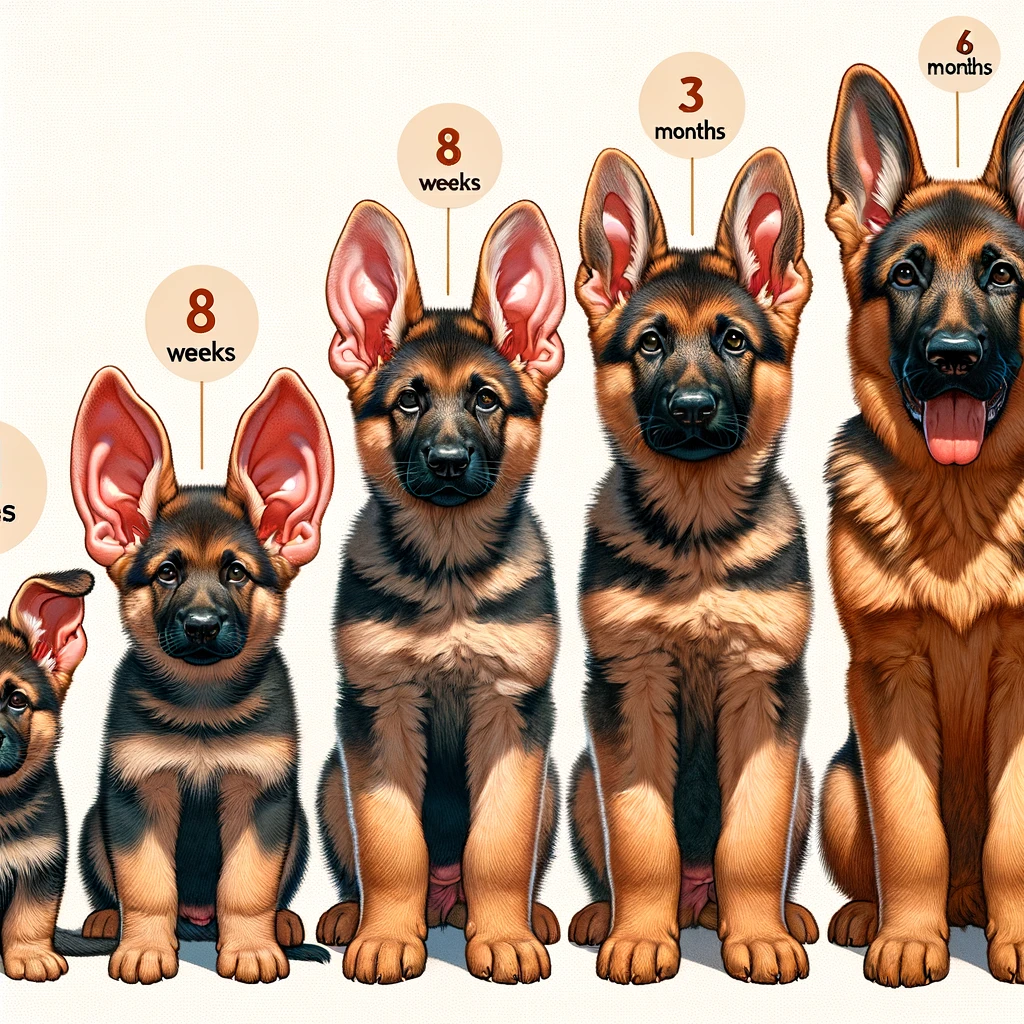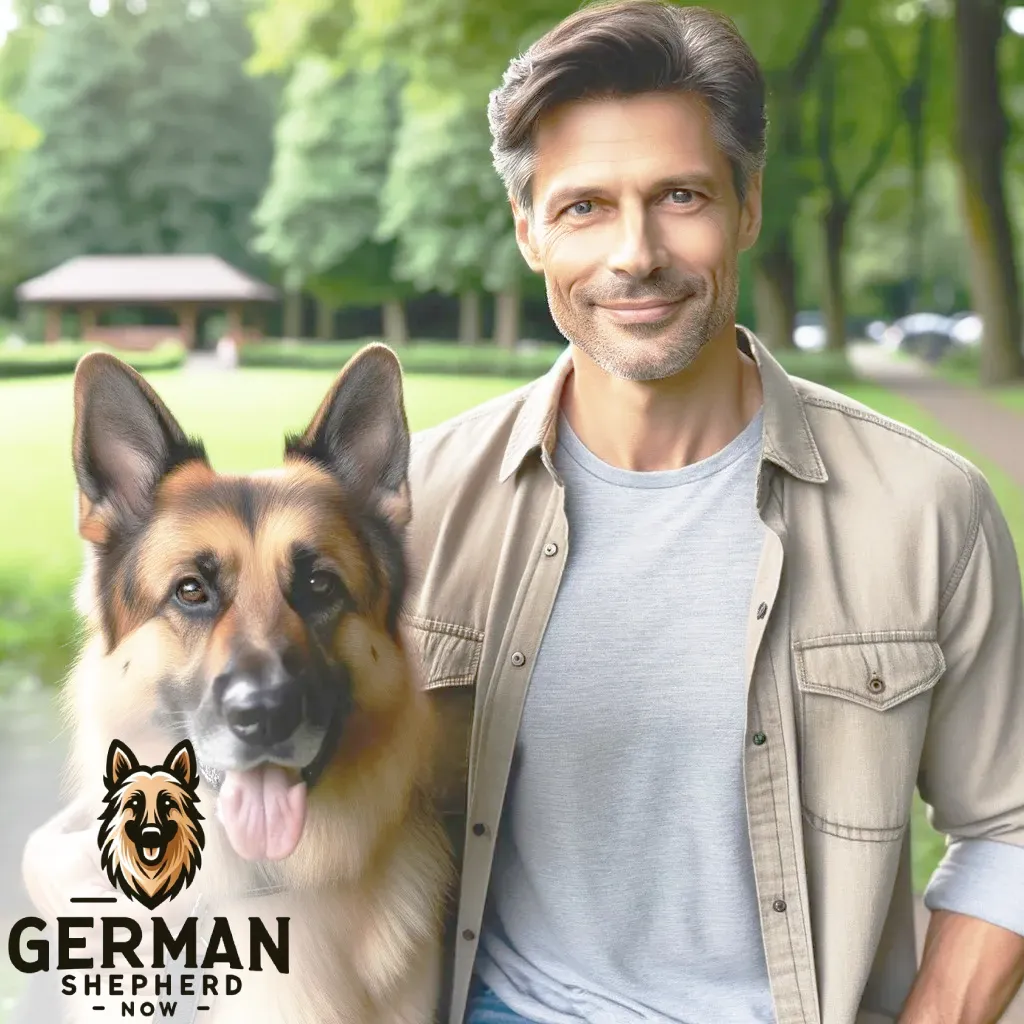When Do German Shepherd Ears Stand Up?

German Shepherd puppies start to have their ears stand up between 8 weeks and 6 months, but this can vary with each dog.
The process is influenced by genetics, health, nutrition, and the puppy’s growth rate.
It’s important to note that while most will develop upright ears during this timeframe, some may take longer or need assistance due to genetic or health reasons.
10 Key Factors About German Shepherd Ears Stand-Up
German Shepherd puppies are known for their distinctive pointy ears, but these do not stand up immediately after birth. Various factors influence the process, each crucial in developing this characteristic trait.
Ten key factors determine when and how a German Shepherd’s ears will stand up.
1. Genetic Heritage
Genetics is the most significant factor in ear development. If a puppy’s parents both have strong, upright ears, it’s more likely their offspring will too.
This hereditary trait is passed down through generations, and purebred German Shepherds often have a higher likelihood of developing standing ears due to selective breeding. Genetic diversity means there’s always some unpredictability.
2. Age and Development
The age range for ears to start standing is between 8 weeks and 6 months. This is part of the natural growth and development phase of a puppy.
In the early weeks, the ear cartilage is still soft and not strong enough to hold up the weight of the ears, but as puppies grow, this cartilage strengthens and begins to hold the ears upright.
3. Nutritional Balance
Nutrition is vital to a puppy’s overall development, including their ears. Puppies require a diet of proteins, vitamins, and minerals to develop strong cartilage and muscles.
A deficiency in essential nutrients, particularly calcium and vitamin D, can hinder the proper development of ear cartilage, leading to delayed or incomplete ear standing.
4. Teething Process
The teething phase can affect ear posture between 3 and 6 months. During this period, puppies may divert calcium to tooth development, which can cause their ears to flop.
Usually, once teething is complete, the ears may start to stand up more, provided other factors like nutrition and genetics are favorable.
5. Physical Health
Overall, health impacts ear development. Illnesses, especially those affecting a puppy’s growth or calcium absorption, can delay or prevent ears from standing up.
Regular veterinary check-ups and a healthy lifestyle are essential for ensuring the puppy’s ears develop.
6. Breed Purity
While not guaranteed, purebred German Shepherds are more likely to develop standing ears due to selective breeding.
Mixed-breed German Shepherds might have a different ear structure, influenced by the other breeds’ genetic makeup, which might affect the likelihood or timing of ears standing up.
7. Environmental Stressors
Stressful environments can impact a puppy’s physical development. Living conditions, socialization, and emotional stress can influence a puppy’s health, including ear development.
Ensuring a calm, nurturing environment helps in the healthy growth of a puppy, including the proper development of their ears.
8. Physical Activity
Regular exercise and play are crucial for a puppy’s development. Adequate physical activity ensures health and well-being, which can affect the ear-standing process.
Exercise helps strengthen muscles and cartilage, including those in the ears, aiding in proper development.
9. Human Intervention
Some owners opt for interventions like taping if ears don’t stand up by a certain age. While this can sometimes help, it’s important to approach it under professional guidance.
Taping or massaging the ears should be done to avoid causing harm and should only be considered after consulting a veterinarian.
10. Individual Variability
Finally, every German Shepherd and their development timeline are unique. Factors like ear size, the puppy’s growth rate, and individual health conditions can influence when their ears stand up.
Some puppies may develop standing ears earlier or later than the typical age range, which is normal.
Effective Ways to Assist in Fixing German Shepherd Ears
Ensuring that a German Shepherd’s ears stand up is a common concern among owners of this breed.
While most puppies develop upright ears, there are ways to assist in this process if they are having trouble.
Here are some effective methods:
- Nutrition and Supplements: A balanced diet rich in essential nutrients is crucial. Calcium and vitamin-rich foods help in strengthening ear cartilage. Supplements, especially those designed for puppies, can also support healthy ear development.
- Teething Toys: Since teething can affect ear positioning, offering appropriate toys can help. These toys can reduce the need for calcium elsewhere in the body, helping the ears to stand up.
- Ear Massages: Massaging your puppy’s ears can improve blood circulation to the area. This should be done to avoid harm to the delicate ear structure.
- Taping: In cases where natural methods don’t work, taping the ears can be considered. This should only be done under the guidance of a veterinarian or a professional dog trainer, as improper taping can cause damage.
- Minimizing Stress: A stress-free environment is important for a puppy’s development. Stress can impact physical development, so a calm, nurturing environment can help ear development.
- Regular Check-ups: Regular veterinary check-ups can help identify and address any health issues affecting ear development.
- Avoiding Rough Play: While puppies should be encouraged to play, it’s important to supervise playtime to prevent ear injury, which can hinder their ability to stand up.
Remember, patience is key. Most German Shepherd ears will stand up in time, and these methods should only be considered if there is a noticeable delay or issue.
Consulting with a veterinarian before trying any intervention is always recommended.
Conclusion
In conclusion, developing upright ears in German Shepherd puppies involves genetic, nutritional, and environmental factors.
While most puppies will have their ears standing up between 8 weeks and 6 months, owners should be patient and provide proper care and nutrition.
Remember, each puppy is unique, and their development can vary. By understanding these aspects, owners can better support their puppy’s growth and enjoy watching their German Shepherd grow.

I’m Martin, and I grew up in the super cool city of Seattle. You know, the place with all the incredible mountains and forests? Yeah, that’s my playground!
Ever since I was little, I’ve been all about nature. I used to wander around the woods with a notebook, doodling all the cool plants and animals I’d find.
